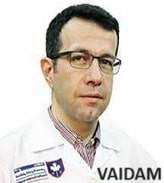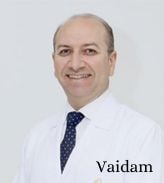Listing popular specialists:

Consultant, 20 years of experience

Neonatal and pediatric ophthalmology (strabismus; treatment of lazy eye, vision problems, lacrimal duct obstruction, etc.) Medical retina: intravitreal injections Lucentis/eyelet and retinal laser photocoagulation for diabetic retinopathy; macular degeneration; ROP and other vascular diseases of the retina. Glaucoma: medical and surgical treatment of glaucoma and examination of optic nerve lesions. Eyelid cosmetic surgery (blepharoplasty, entropion, ectropion, xanthelasma) evaluation of corneal diseases Pterygium surgery with graft Treatment of dry eye, Infections, and inflammations ( uveitis ) of the eyes. Refractive error ( myopia, hyperopia, astigmatism, presbyopia)

Principal Consultant, 25 years of experience

Microsurgery of eye Intraocular correction

Senior Consultant, 20 years of experience

Keratoconus Lasik Glaucoma Surgery

Consultant, 18 years of experience

Macular Degeneration Surgery Vitrectomy LASIK

HOD, 25 years of experience

Retinopathy of Prematurity, Sickle Cell Retinopathy, Genetic Retinal Diseases, Uveitis, Neuro Ophthalmology

Consultant, 10 years of experience

Glaucoma, Retinal Disease, Pediatric Ophthalmology, Oculoplasty

Consultant, 20 years of experience

Squint Evaluation in Children and Surgical Squint Repair, Glaucoma Diseases and Intraocular Pressure Control, Lacrimal Canal Disease and Surgery, Diabetic Retinopathy Screening and Treatment

Consultant, 8 years of experience

Cataract- Small incision cataract surgery (SICS), Glaucoma, Pediatric and adult refraction, Diabetic retinopathy, Uveitis

Consultant, 24 years of experience

Management of keratoconus, Pediatric ophthalmology including medical management of squint, Glaucoma management, Laser treatment of Retina and YAG capsulotomy

Consultant, 30 years of experience

Macular hole, PHACO surgery, Pediatric surgery, Squint surgery, Corneal transplantation (including penetrating keratoplasty and DALK), DSEK surgery, Glaucoma surgery, Refractive LASIK

Consultant, 15 years of experience

Eye Infection, Conjunctivitis (Pink Eye), Red Eyes

Consultant, 15 years of experience

Corneal Cross linking, Presbyopia Correction, Keratoplasty

Consultant, 17 years of experience

Vertigo Treatment, Routine Eye Check Up, Vitreo-Retinal Surgery, Laser Cataract Surgery

Consultant, 18 years of experience

Fuchs' Dystrophy, Correction of Myopia, Keratoconus, Hyperopia

Head of Department, 25 years of experience

Medical & surgical treatment of squint, Correction of Myopia, YAG Laser for glaucoma and after cataract surgery

Consultant, 22 years of experience

Squint (crossed eye) evaluation & management, Pediatric ophthalmology, Amblyopia (lazy eye), Retinal diseases

Consultant, 15 years of experience

Glaucoma treatment, Treatment of myopia, Hypermetropia, Refractive surgery

Consultant, 20 years of experience

Facial Nerve Palsy: Including Gold Weights, Thyroid Eye Diseases, Orbital Tumors, Orbital Fractures

Consultant, 10 years of experience

Glaucoma Management, Corneal diseases and ocular surface disorders

Consultant, 24 years of experience

<p dir="ltr">Dr. Mohit Jain specializes in:</p> <ul dir="ltr"> <li>Cataract surgery</li> <li>Corneal transplantation</li> </ul>
Our Services for Cornea Transplant in United Arab Emirates
Transparent - Professional - Without Hassles

Angola Patient Got His Vision Back With Cornea Transplant Surgery in India
A cornea transplant (keratoplasty) is a surgical procedure to replace part of your cornea with corneal tissue from a donor. It is NOT a major surgery.
Most corneal transplants last well beyond 10 years.
You'll probably remain awake during the transplant but you may receive a sedative to help you relax. Your surgeon will inject local anesthetic around the eye to prevent pain and to keep your eye muscles from moving.
Your eye colour will not change after a corneal transplant.
In favorable subjects the rate of success of corneal transplantation may be as high as 90%.
Your eyesight should gradually improve a few weeks after a corneal graft but it could take anywhere from a couple of months up to a year to have stable vision in the eye that receives the donor tissue.
For transplant procedures that use a gas bubble inside the eye to help position the transplanted tissue the surgeon may ask you to lie flat sometimes during the day and sleep flat on your back at night for a few days.
Cornea transplant is the surgery which is used to remove all or part of damaged cornea and then replace it with healthy donor tissue; it is used to improve sight and relieve pain and to treat severe infection or damage.
You may be the candidate for corneal transplant if you are having problem in vision due to keratoconous or other condition which causes cornea to become thinner. You may also need transplant if you have any scar due to previous injury or infection.
Cornea transplant is a very safe procedure but it there is always some risk of the procedure such as an eye infection and its pressure increases within the eyeball.
The success rate of corneal transplant 91% some of the indications of corneal transplant is keratoconus, bullous keratopathy and failure of previous graft. Most common causes of graft failure were rejection, infection and glaucoma.
Its an 1 hour procedure.
Corneal transplant will usually take less than an hour depending on your condition whether you should be in the hospital or you need overnight stay. If transplantation of outer cornea is needed then new cornea is being held in place with stitches.
You will be given local anaesthesia around your eye region to block pain and prevent eye movement during surgery.
There is various methods of doing corneal transplant
Full Thickness Corneal Transplant- All the layers of your cornea get replaced. The new cornea is get stitched, this procedure is only needed if you have severe corneal injury or bad bulging or scar formation.
Partial Thickness Corneal Transplant- Air is injected to lift off and separate the thin layer outside and the thick middle layer of cornea and then removes and replaces them.
Endothelial Keratoplasty -The surgeon removes the endothelium and they replace them with a donated endothelium and Descemet membrane still attached to the stroma (the cornea's thick middle layer) to help in handling the new tissue without damaging it.
Fuch's dystrophy- This involve removal of the central part of the inner membrane without a transplant, if the surrounding cornea seems healthy enough to provide cells to fill in the removed area.
You will probably be able to return to work or your normal routine in about 1 to 2 weeks after surgery but your vision will still be blurry and you will need to avoid heavy lifting for about 4 weeks
You must not drive on the day of your cornea transplant. Someone must drive you home after surgery and bring you back for your follow-up visit. If you have good vision in the non-transplant eye you can legally drive 24 hours after surgery.
Medicines will be given for 6 months.
It will take up to a year to recover completely from corneal transplant but most people can go back to normal routine within one to two weeks but they should avoid lifting heavy objects. You should wait for minimum four weeks before lifting any heavy objects.
Most of the cases of corneal transplant last beyond 10 years, patients require ophthalmic checkup for twice in a year to make sure that they eye health are good. The cornea donor tissue is thoroughly inspected for its safety.
Some of the risks of corneal transplant includes infection, bleeding, higher pressure in eyes, clouding of eye lens, swelling of the cornea and detached retina.
Most of the people can see the result of the procedure when there vision is restored but it will take few weeks to improve the vision completely, your eyesight may get little worse before getting better.

Life After Cornea Transplant

Cornea and its Treatment Explained by Dr. Bhupesh Singh of Bharti Eye Foundation, New Delhi






NABH Certified Healthcare Discovery Platform
Vaidam is NABH certified healthcare discovery platform that will connect you to top-notch medical experts, hospitals, wellness options, and trusted travel partners to help identify and make the right healthcare choices.

Researched & Personalized Treatment Plan - Under One Roof
You can search for the best hospitals, read about them, view photographs of the facilities at the hospitals and the places at which the hospitals are located, and check the cost of treatment.

Quality Treatment Within Your Budget
As soon as you post an enquiry, the patient relation team will collect details from you, share them with the doctors and hospitals on Vaidam's panel, and get a personalized treatment plan. We research to get quality treatment within your budget.

Treatment to Travel
Vaidam concierge assists patients, to get medical Visa, the best airline fares and arrangements for your stay. Our concierge also helps you with daily travel, language, and food concerns. Vaidam does everything to be your perfect host. All of Vaidam’s services are free of cost to patients.

International Reach
Vaidam Health has network in 15+ countries, which includes India, Turkey, UAE, Germany, South Korea, Thailand, Malaysia, Spain.
Note: Vaidam Health does not provide medical advice, diagnosis or treatment. The services and information offered on www.vaidam.com are intended solely for informational purposes and cannot replace the professional consultation or treatment by a physician. Vaidam Health discourages copying, cloning of its webpages and its content and it will follow the legal procedures to protect its intellectual property